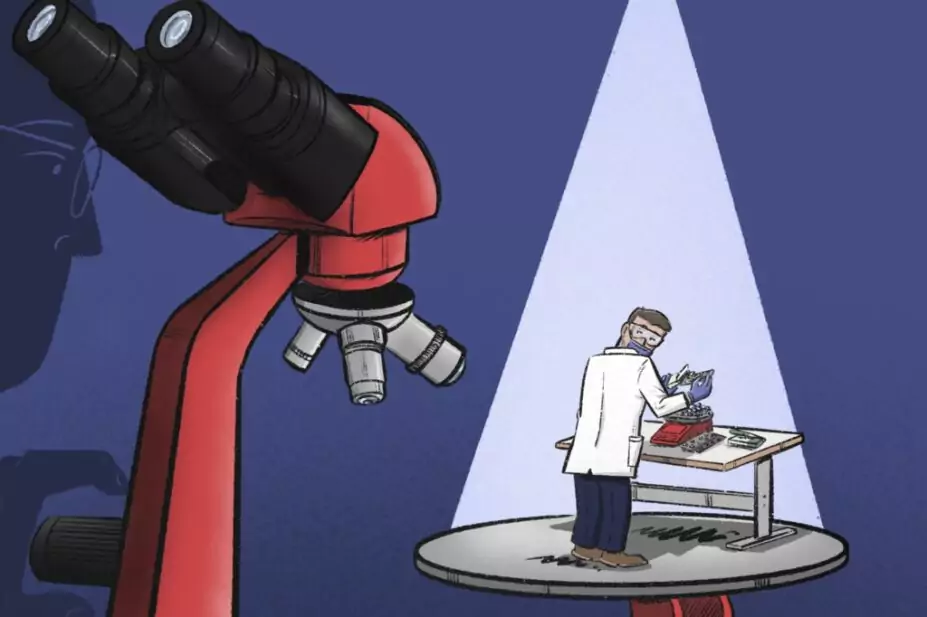
Wes Mountain/The Pharmaceutical Journal
Arguably one of the most complex and controversial areas of pharmacy regulation, ‘supervision’ of the assembly and dispensing of medicines is now subject to a set of new proposals from the government.
The Department of Health and Social Care (DHSC) put its proposals out for consultation in December 2023, following the publication of a report by the sector-wide Supervision Practice Group (SPG) in August 2023.
Work among pharmacy groups on a revision of supervision legislation began in 2021, four years after proposals from the government’s Rebalancing Medicines Legislation and Pharmacy Regulation Programme Board were quietly dropped.
One of the reasons that supervision has remained so controversial is that it has no clear definition. Instead, the both pharmacists and the government it through an amalgamation of legislation and case law that has developed over time.
What is supervision?
There is no specific definition in primary legislation, although broad terms are set out in regulation 220 of the Human Medicines Regulations 2012, which says that a person must not sell a medicinal product unless that person is a pharmacist, or unless “the transaction is carried out on [the person’s] behalf by another person, that other person is, or acts under the supervision of, a pharmacist”.
Section 10(1) of the Medicines Act 1968 also states that medicines can be prepared and dispensed under the supervision of a pharmacist, but gives no further detail on what that means in practical terms.
The interpretation of what supervision means was based for many years on a 1943 legal case, Roberts vs. Littlewoods Mail Order Stores Ltd, where Littlewoods stores — which had contained pharmacies — did not have a pharmacist for every store. The judge ruled that a pharmacist needed to be present in the store, concluding that, under the Pharmacy and Poisons Act 1933, there were two elements to the supervision obligation: the pharmacist needed to be “aware of what is going on at the counter” and “in a position to supervise or superintend the activities” of the person making the sale or supply.
In its recent proposals, the government says that this legal opinion constituted a “relatively settled” view on what supervision meant over a long period of time, but it adds that, as pharmacists have shifted towards providing more clinical services in recent years, this view has been put under strain.
In 2005, the Royal Pharmaceutical Society of Great Britain (now Royal Pharmaceutical Society [RPS]), which was then both the regulator and the professional body for pharmacists, expressed its position on supervision of supply of dispensed medicines and sale of P medicines.
The Society confirmed the need for a pharmacist to “professionally assess every prescription”, and said that, at the stage of final supply, the supervising pharmacist must be both “on the premises and interruptible”, although they could be working elsewhere in the pharmacy at the time.
These guidelines are not legally binding, and the government’s consultation says the changes it is proposing could not be achieved by the RPS publishing further guidance on the meaning of supervision.
In fact, the government says it is not “redefining supervision”, but instead introducing “new routes to the lawful preparation, assembly, dispensing and final sale or supply [of medicines]”.
What changes are the government proposing?
Three changes are put forward in the consultation document.
Under the first proposal, which would see both the Human Medicines Regulations 2012 and the Medicines Act 1968 amended, pharmacists could authorise pharmacy technicians in “either specific or general terms”, to carry out “the preparation, assembly, dispensing, sale and supply of medicines or with the authorisation of the pharmacist, to supervise others to carry out these tasks”. For example, this could relate to a particular transaction or to a range of prescriptions or categories of medicines.
Recognising and more effectively utilising the skills of every member of the pharmacy team will enable pharmacists to spend a greater proportion of their time delivering patient-facing clinical service
The four UK chief pharmaceutical officers
The second proposal would add an amendment to existing laws, enabling pharmacists to authorise “any member of the pharmacy team” to hand out dispensed prescriptions, which have already been checked for clinical appropriateness and accuracy, in the pharmacists’ absence. This amendment could be used when the pharmacist cannot be interrupted in a consultation room or is temporarily absent from the premises. The government says that this change would end an inconsistency in the law, which currently allows a delivery driver to hand over medicines to a patient but requires a pharmacist to supervise staff members handing over the same medicine on a registered pharmacy premises.
The third proposal would allow pharmacy technicians to “supervise the preparation, assembly and dispensing of medicines in hospital aseptic facilities”, and would enable suitably qualified and experienced pharmacy technicians to be responsible for a hospital aseptic facility without having to act under the supervision of a pharmacist. However, the proposals say that the pharmacy service must still be overseen by a chief pharmacist, who would be responsible for ensuring the safe and effective running of the service.
Why are these changes being proposed?
The government states that the proposals aim to “enable new ways of working that will shape pharmaceutical care in the future”.
A statement from the four UK chief pharmaceutical officers (CPhOs) at the beginning of the proposals says that “recognising and more effectively utilising the skills of every member of the pharmacy team will enable pharmacists to spend a greater proportion of their time delivering patient-facing clinical services — using their training and expertise, including prescribing, to release capacity in the wider NHS”.
An impact assessment, published alongside the supervision proposals, also notes that expanding the responsibilities of pharmacy technicians “should help to fill vacancies in aseptic units and maximise the possibility of producing injectable medicines; a sector where advances in medical science suggest this sector will grow substantially, and therefore maximise the health benefits to patients”.
A 2022 survey of NHS trusts by the British Oncology Pharmacy Association on the state of anticancer therapy provision in the UK revealed vacancy rates of 20.6% in technical services staff and 19.0% in clinical services staff in aseptic units.
The DHSC estimates that the changes in the proposals could provide efficiencies of more than £380m for community pharmacies over the next ten years.
What are the risks?
The impact assessment includes the admission that “there may be impacts on safety” as a result of the changes.
“The reduced pharmacist supervision could increase the number of errors made,” it says. “However, this is mitigated by the fact that a pharmacy technician is a registered and regulated healthcare professional in their own right, with education and training to undertake dispensing of medicines.”
The proposals have been widely welcomed across the pharmacy profession, with few concerns expressed.
The Pharmacists’ Defence Association said it was “reassuring” that the DHSC proposals “broadly supports” the SPG’s proposals, and that, if undertaken “in the right way”, it was an opportunity for “welcome transformational improvements in pharmacy practice”.
However, the PDA also expressed caution, arguing that the model of supervision needed to support the “modernised model of practice” described in the SPG report “can only be delivered if changes to the law are simultaneously supported by new and joined up rules and regulations from the regulator and followed through by appropriate professional guidance”.
The impact assessment on the proposals estimates training and education costs of around £3m to implement any changes.
Are pharmacy technicians qualified to take on a supervisory role?
In its response to the supervision proposals, Claire Steele, president of the Association of Pharmacy Technicians UK (APTUK), said: “Pharmacy technicians are skilled and experienced in the sale and supply of medicines and are ideally placed to support the evolution of pharmacy practice and the wider healthcare system to optimise pharmaceutical care for patients and the public, working alongside our pharmacist colleagues and the wider pharmacy team.
The proposed changes would support the recognition of the pharmacy technician profession as key to ensuring pharmacy services meet the challenges of the future
Claire Steele, president of the Association of Pharmacy Technicians UK
“The proposed changes would support the recognition of the pharmacy technician profession as key to ensuring pharmacy services meet the challenges of the future.”
The government says that “limiting” the ability of pharmacists to only authorise pharmacy technicians to take on the preparation, assembly, dispensing and sale or supply of medicines, or to supervise others to carry out these tasks, is a patient safety measure.
It says this is “designed to ensure that the legislation starts from the premise that a registered pharmacy professional, who is accountable for their practice to the regulator, is going to be doing or supervising the preparation, assembly, dispensing and sale and supply of medicines”.
Under its third proposal, to allow pharmacy technicians to supervise the preparation, assembly and dispensing of medicines in hospital aseptic facilities, the government says: “Pharmacy technicians are increasingly the most experienced professionals working in aseptic units with many suitably qualified and experienced to oversee aseptic production.”
It adds that with hospital pharmacists spending more time in patient-facing clinical roles, “pharmacy technicians are now often more experienced in aseptic production than some of their pharmacist colleagues”.
How does this differ from previous moves towards supervision changes?
Documents leaked to the press in 2016 suggested that proposals were being drawn up that would allow a “registered pharmacy professional” to “take responsibility for” the sale and supply of P or POM medicines.
According to press reports at the time, the proposals were included in documents prepared by a short-life working group, established by the four CPhOs.
The group was part of the Rebalancing Medicines Legislation and Pharmacy Regulation Programme Board, and according to the working group’s terms of reference, it was expected to produce a report by March 2016, which in turn would inform a paper from the four CPhOs to the Board that would “provide advice on supervision”.
This report was not published, but according to meeting minutes, the topic was discussed several times at Board meetings. Minutes from a meeting held on 12 October 2016 state that, in a discussion on supervision, “some members indicated they did not agree certain aspects of the emerging proposals to enable all registered and competent pharmacy professionals to supervise the sale and supply of medicines”.
Initially, the Board’s proposals gave rise to concerns around the possibility of “remote supervision”, which would see pharmacists operating a pharmacy from afar by clinically checking prescriptions remotely online and advising or assessing patients using video consultation services.
These concerns were further heightened following the government consultation in 2018 on ‘Pharmacy legislation on dispensing errors and organisational governance’, which included proposals to amend legislation that would clarify the roles and responsibilities of the Responsible Pharmacist. The consultation did not mention remote supervision. However, a government response to the consultation, published in April 2022, said that these concerns were “raised repeatedly throughout consultation responses”. The response clarified that the consultation “did not raise proposals in relation to remote supervision”.
Is the government making proposals in relation to remote supervision this time?
The proposals state clearly that they “are not a move towards allowing pharmacists to remotely supervise a community pharmacy”, adding that the physical presence of the Responsible Pharmacist in a community pharmacy “is enshrined in primary legislation that is not being changed as part of this reform”.
This is in line with the report from the SPG group, in which all members agreed that supervision means that a pharmacist should be present in the pharmacy and accessible to patients, and it recommended that public, primary and secondary legislation should be “clarified” and “updated” to reflect this.
Box: Responses to the supervision proposals
Nick Kaye, chair of the National Pharmacy Association, said: “Modernisation of the regulations is well overdue, for example the ability to delegate to any member of the pharmacy team to hand out checked and bagged prescriptions in the absence of a pharmacist. We will examine the consultation document thoroughly, to check for any unintended consequences that could reduce access to pharmacists. Any changes to legislation or regulations should maintain or improve, not diminish, the public’s access to a pharmacist in a community pharmacy.”
Malcolm Harrison, chief executive of the Company Chemists’ Association (CCA), said: “The CCA is pleased to see the sector and the profession collaborate on the important issue of supervision. All participants agreed on the need for change which is crucial to realising the increasingly clinical future expected of the sector. These changes provide the basis for the greatest evolution in pharmacy practice for 70 years.”
Gordon Hockey, director of legal at Community Pharmacy England, said: “As the clinical skills of community pharmacists are put to greater use through services such as Pharmacy First, it is important to ensure that pharmacies can make best use of skill mix across the whole team.”
A statement from the Royal Pharmaceutical Society (RPS) said: “Extensive engagement with RPS members has helped create the organisation’s policy position statement, ‘Strengthening pharmacy governance’, which outlines the principles which should apply to any legislative change to facilitate the provision of progressive and safe pharmacy services within the context of an advancing NHS.
“RPS has actively participated in the Pharmacy Supervision Practice Group, contributing to the collaborative report, ‘Supervision in community pharmacy’, alongside other pharmacy organisations.
“Members of the RPS are encouraged to share their insights and perspectives on the consultation by emailing consultations@rpharms.com. RPS will build on these together with the expertise of its board members, who serve as elected representatives, to further shape its response to the DHSC consultation.”
The consultation on supervision legislation closes on 29 February 2024.
2 comments
You must be logged in to post a comment.
You may also be interested in

What are the views of the RPS and Pharmaceutical Press on AI training using copyrighted materials?

Government should consider ways to prevent ‘inappropriate overseas prescribing’ of hormone drugs, review recommends

Are the systems in place in dispensaries run by doctors' surgeries being similarly evaluated?
Reading the impact assessment, it mostly involves assumption, and the impact on patient safety constitutes just a few speculative lines.